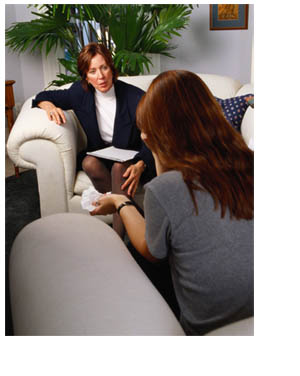Therapy for At-Risk Teens

Teenagers are working through new feelings and problems. Many times it is difficult for adolescents to express exactly what they are feeling. Skilled therapists help open communication with troubled teens and work through problems. Once a student understands how to communicate thier feelings they usually can work through family issues. At the root of all therapy is a healthy dialog.
Wilderness Therapy - This type of therapy places the troubled teen in a wilderness setting for a short time (usually 6 to 12 weeks). It is sometimes refered to as a wilderness program. The outdoor settings, a new environment, and a new set of challanges helps the teen clear their head and evaluate their lives from a different perspective.
Psychoanalytic Therapy - Often refered to as "talk therapy". It involves a patient talking about their life strories, struggles, and achievements while the therapist looks for paterns and things which might explain the problems currently facing the patient. The sharing of feelings and struggles with a neuatral therapist tends to help lighten the burderden for some patients. Psychoanalytic therapy is often criticized for being ineffective, time consuming, and expensive.
Group Therapy - Group therapy is a form of phychotherapy. It invovles two or more patients and a licensed therapist. Groups are usually play a supportive role in changing a destructive behavior. Group therapy works best when a specific type of problem is being addressed.
Behavioral and Cognative Therapy - These types of therapy focus on a specific problem. The therapist will work on thought patterns or faulty logic in the patient which leads to the specific problem (cognative therapy). Once the thought paterns have been explored a therapist will provide scenarios in which the patient faces the issue troubling them. Each session the therapist will increase the expsure to the situation until the patient can face it completely on their own. By combining cognative and behavioral therapy many specific problems like fears, anxiety, and depression are resolved.
Art Therapy - Is the mixing a art and therapy to address most emotional, addiction, and phycological problem a patient might have. Therapy sessions are run by a therapist with a background in art. The constructive and creative approach to art therapy helps many patients resolve problems more quickly than with other types of therapy.
Family Therapy - A therapist will work with the family as a group and with individuals on specific problems. The therapist will help the family expore and identify positive and destructive patterns and behaviours. Communication and understanding is at the foundation of family therapy.
Do you have any recommendations?
Please email contact [at] fortroubledteens.com
NOTE: Remove the spaces and brackets so the address looks
like are regular email address.